The Diet-Climate Connection
Programs 299, 300 • 1 hr
CDs available via special order. HumanMedia ®
Programs 299, 300 • 1 hr
CDs available via special order. HumanMedia ®
Produced in association with GBH / Boston
Heard on NPR and PRX member stations
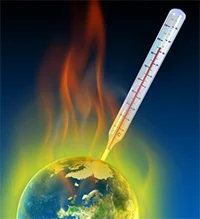 What was the carbon footprint of your dinner last night? Agriculture is a huge emitter of greenhouse gases associated with climate change. This is an important emerging topic as Americans grapple with record-breaking heatwaves, drenching rains, coastal flooding, prolonged droughts, sprawling wildfires and other weather extremes as “the face of global warming”. These conditions directly affect how – and whether – our food is grown.
What was the carbon footprint of your dinner last night? Agriculture is a huge emitter of greenhouse gases associated with climate change. This is an important emerging topic as Americans grapple with record-breaking heatwaves, drenching rains, coastal flooding, prolonged droughts, sprawling wildfires and other weather extremes as “the face of global warming”. These conditions directly affect how – and whether – our food is grown.
 Listeners to this sound-rich inquiry will learn that climate scientists increasingly focus on food production as a source of heat-trapping gases. We’ll discuss which major food groups have the lowest environmental footprint (fruits and vegetables) and which have the highest (red meat and dairy), and why. Interestingly medical experts recommend that our diets emphasize many of the same foods that scientists regard as most climate-friendly. That’s the remarkable connection between diet and climate.
Listeners to this sound-rich inquiry will learn that climate scientists increasingly focus on food production as a source of heat-trapping gases. We’ll discuss which major food groups have the lowest environmental footprint (fruits and vegetables) and which have the highest (red meat and dairy), and why. Interestingly medical experts recommend that our diets emphasize many of the same foods that scientists regard as most climate-friendly. That’s the remarkable connection between diet and climate.

Frances Moore Lappé
In this audio documentary, we hear an update from author Frances Moore Lappé, whose Diet for a Small Planet, written in her twenties, sold millions of copies and introduced this subject to a broad audience decades ago. An environmental health expert at Johns Hopkins, Roni Neff explains how factory farming – the source of much of our food in the US – is responsible for massive global warming pollution.
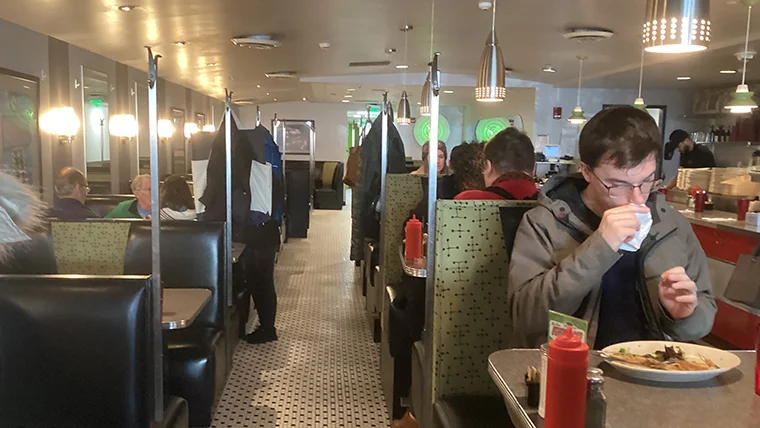
Veggie Galaxy restaurant

Genesis Butler
And we visit Veggie Galaxy, a popular diner-style Massachusetts restaurant, which draws mostly a young crowd of patrons concerned about personal health, climate change and animal welfare – and who love tasty meals! Physician Walter Willett, who served as the long-time Nutrition Dept. chair at Harvard, describes the benefits of eco-friendly eating to your health and to the environment. And you’ll meet Olivia Calkins, Liam Reardon and Genesis Butler, youth activists for a “thriving planet”.
The Diet-Climate Connection
And enjoy these earlier programs:

Frances Moore Lappé
From heatwaves to wildfires to flooding, extreme weather is unmistakably with us in this age of climate change. But a great deal can be done if we act promptly to limit the damage from heat-trapping emissions that cause these conditions. And this is just part of a multi-faceted story we call The Diet-Climate Connection.

Walter Willett, MD
Listen to physician Walter Willett, who served as long-time Nutrition Dept. chair at Harvard; and best-selling author Frances Moore Lappé, whose groundbreaking work has helped alert us to the need for change. Learn which foods release the highest global-warming emissions and which foods release the lowest.
Also, we visit with patrons at Veggie Galaxy restaurant in Massachusetts to find out how people adopt the recommended adjustments to our diets – while enjoying fabulous meals.
We meet three young people, Olivia Calkins, Genesis Butler and Liam Reardon, who’ve decided to alter their diets to reduce their environmental footprint and in some cases based on animal welfare concerns. Their stories include how their families have adapted to this new choice. We also hear a fascinating older interview with anthropologist Sidney Mintz, who served in WW2, when soldiers were fed meat three times a day — producing a surge in livestock production, as well as coffee and tobacco consumption. And we learn that a more plant-based diet — or even being a strict vegan — can be a very healthy choice.

Olivia Calkins, Genesis Butler and Liam Reardon.
Hundreds of colleges are now moving toward healthier, more climate-friendly food choices on campus
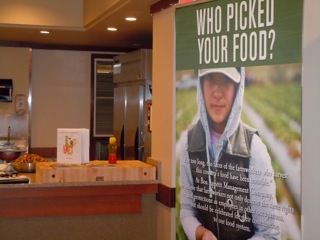 This documentary explores how diet-climate concerns are playing out in higher education, at the campus of Carleton College in Northfield, Minnesota (near Minneapolis-St.Paul). Students and administration there share a commitment to environmental responsibility. And the food service (staffed by an unusual provider known as, Bon Appetit) has adjusted menu offerings accordingly – and deliciously!
This documentary explores how diet-climate concerns are playing out in higher education, at the campus of Carleton College in Northfield, Minnesota (near Minneapolis-St.Paul). Students and administration there share a commitment to environmental responsibility. And the food service (staffed by an unusual provider known as, Bon Appetit) has adjusted menu offerings accordingly – and deliciously!
This fascinating new movement is touching more than 200 U.S. campuses, where students are pressing for more sustainable dining services, including an emphasis on locally-grown food (which reduces carbon footprint by minimizing heavy-emission, long-distance transport of food).
We hear why students are so passionate about this trend. And we learn ways of combatting an unnecessary source of emissions: food waste. Also, a visit with a family-run organic farm.
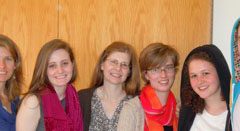 I learned a lot about how our food system operated, and how it related to the environment and to our personal health. And what a crisis we’re facing with climate change, and other environmental ills… And I was really upset about it.”
I learned a lot about how our food system operated, and how it related to the environment and to our personal health. And what a crisis we’re facing with climate change, and other environmental ills… And I was really upset about it.”
—Lindsay Gutherie, student, Carleton College
 We try and stay away from some of the high carbon [foods]. We’ve got beef and cheese galore here in the off season, in our downtime in the winter. But we’re really trying to support as much vegetarian and veganism as possible…and it’s a tasty alternative, they don’t even know what they’re missing nine times out of ten.”
We try and stay away from some of the high carbon [foods]. We’ve got beef and cheese galore here in the off season, in our downtime in the winter. But we’re really trying to support as much vegetarian and veganism as possible…and it’s a tasty alternative, they don’t even know what they’re missing nine times out of ten.”
—Michael DelCambre, Carleton College Executive Chef, Bon Appetit Management Co.
Parents, educators, students and USDA officials describe surprising improvements in the food served to children
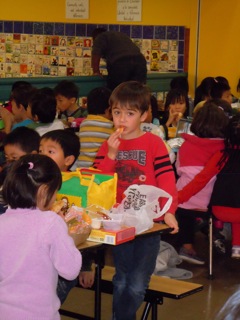
Stonehurst Elementary School, Oakland, CA
Public school cafeterias are changing! We visit two in New England where recent policies reflect much greater attention to healthy meal options than were typically available in the past. Codman Academy, a public charter high school in Boston’s inner city, banned junk food from campus, and the buying of fast food during school hours; kids at the school now can access veggie-burgers, low-calorie foods, and other healthier options. In Burlington, VT, the public schools have prioritized supporting local agriculture (partly for environmental benefits), and catering to a student body representing dozens of cultures and cuisines. We hear school staff, students and community agriculture activists.Also: a look at landmark recent improvements in USDA school meal rules, and the challenges of inducing schools to provide healthier foods—and of enticing kids to eat them!
 I’m not concerned about what [food] they access here, because I know that they eat healthy. Outside of school, it’s a different story.”
I’m not concerned about what [food] they access here, because I know that they eat healthy. Outside of school, it’s a different story.”
—Olivia Brown Pina, Parent of Codman Academy student in Dorchester, MA
 Once you get that awareness that there’s all this great food out there that isn’t in a box, that isn’t full of added sugar, or sodium, or all sorts of other stuff, I think there’s a lot more interest on the part of the kids.”
Once you get that awareness that there’s all this great food out there that isn’t in a box, that isn’t full of added sugar, or sodium, or all sorts of other stuff, I think there’s a lot more interest on the part of the kids.”
—Andy Jones, Farm manager, Intervale community agriculture center in Burlington, VT
Which foods have the largest global warming footprint and which are most climate-friendly?
We start by visiting the kitchen of Frances Moore Lappé, whose ground-breaking 1971 book Diet for a Small Planet laid the basis for today’s understanding of the link between the environment and the food we eat. And we hear from her daughter, Anna Lappé, also a gifted author, who explains how our food choices affect the daunting problem of climate change. Then we learn how heavily industrialized agriculture—especially the conventional production of livestock—produces significant emissions of greenhouse gases. We hear about the “Meatless Monday” movement, which parallels a WW2-era campaign to reduce meat consumption, today championed by Oprah Winfrey and Paul McCartney (whose song about it is included). And we tour a supermarket accompanied by a physician and best-selling author, to learn about healthy food choices that are also climate-friendly.
 There has been a lot less discussion of meat than a lot of the other factors, in terms of what we can do as individuals to influence climate change… But we need to talk about diet, and if that’s where we can make our impact, then that’s what people need to know, and understand.”
There has been a lot less discussion of meat than a lot of the other factors, in terms of what we can do as individuals to influence climate change… But we need to talk about diet, and if that’s where we can make our impact, then that’s what people need to know, and understand.”
—Roni Neff, research and policy director, Johns Hopkins Univ. Center for a Livable Future, Baltimore
 There’s just tremendous waste built into our food system, and then of course the outcome: creating a people such as we are today whose food is really a health threat, that many of our top diseases are now food-related.”
There’s just tremendous waste built into our food system, and then of course the outcome: creating a people such as we are today whose food is really a health threat, that many of our top diseases are now food-related.”
—Frances Moore Lappé, author, Diet for a Small Planet, Cambridge, Massachusetts
 If you look at the green split peas, lentils, black beans, these cost pennies… all of the beans are very, very high in protein. You’re not going to go wrong with beans.”
If you look at the green split peas, lentils, black beans, these cost pennies… all of the beans are very, very high in protein. You’re not going to go wrong with beans.”
—Neal Barnard, MD, president, Physicians Committee for Responsible Medicine, Washington, DC
The new urban agriculture movement offers a way for us to re-connect our lives to nature
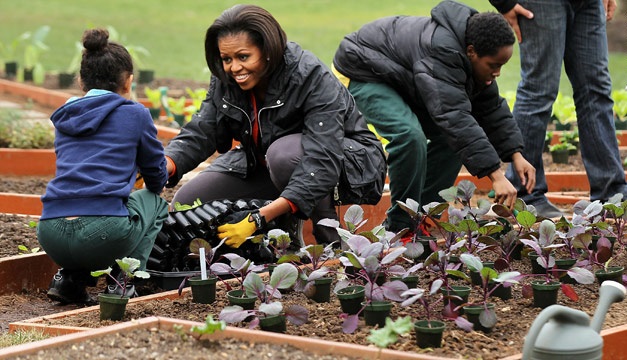
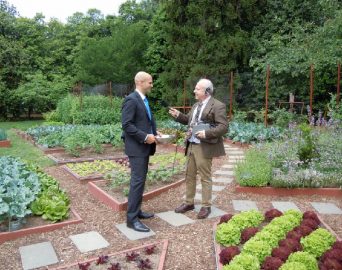 With just 2% of Americans now working on farms, many of us have only mythical images of how our food is produced. But a fascinating new movement brings together people in vibrant gardens and small urban farms, where they grow tasty, nourishing food, save money, get to know their neighbors and combat climate change. Our journey begins at the very productive White House vegetable garden, planted in 2009 by First Lady Michelle Obama; it feeds the president and his family, others at the White House and a local food pantry. We then visit Tonopah Community Garden, recently established in West Las Vegas in a community considered a “food desert” (very limited access to fresh vegetables and fruit); volunteers there discuss how growing food together yields delicious tasty meals and breaks down social barriers.
With just 2% of Americans now working on farms, many of us have only mythical images of how our food is produced. But a fascinating new movement brings together people in vibrant gardens and small urban farms, where they grow tasty, nourishing food, save money, get to know their neighbors and combat climate change. Our journey begins at the very productive White House vegetable garden, planted in 2009 by First Lady Michelle Obama; it feeds the president and his family, others at the White House and a local food pantry. We then visit Tonopah Community Garden, recently established in West Las Vegas in a community considered a “food desert” (very limited access to fresh vegetables and fruit); volunteers there discuss how growing food together yields delicious tasty meals and breaks down social barriers.
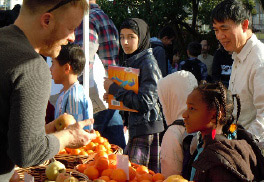
Farmers market at Oakland, CA public elementary school
We then travel to California, where a public park in San Jose hosts Veggielution, a six-acre plot below a flyover freeway, which has drawn thousands of volunteers; and we end up in Oakland at a public school farmer’s market, where students and their families partake of scrumptious, healthy, climate-friendly produce.
 We have seeds from Thomas Jefferson’s Monticello, that he actually used to plant, and grow, and eat himself, and that have been passed down from generation to generation. And it’s been just a great experience to grow these seeds that, you know, are so old. But you know what? They almost always do the best.”
We have seeds from Thomas Jefferson’s Monticello, that he actually used to plant, and grow, and eat himself, and that have been passed down from generation to generation. And it’s been just a great experience to grow these seeds that, you know, are so old. But you know what? They almost always do the best.”
—Sam Kass, White House assistant chef and senior advisor on healthy food initiatives, Washington, DC
 One of the things people are learning is that they can actually do it. And it is just so incredible when you have someone that was [inexperienced] Rosalind Brooks like me initially, and they come in and they have no idea how to plant, and they buy a plot, and they plant some seeds, and they’re actually eating from it in three months. It is just incredible.”
One of the things people are learning is that they can actually do it. And it is just so incredible when you have someone that was [inexperienced] Rosalind Brooks like me initially, and they come in and they have no idea how to plant, and they buy a plot, and they plant some seeds, and they’re actually eating from it in three months. It is just incredible.”
—Rosalind Brooks, founder, Tonopah Community Garden, Las Vegas, NV
 We really view that the meal program is a foundation from which the students will become academically successful. And so by providing them fresh fruits and vegetables, it’s going to help them be ready to learn.”
We really view that the meal program is a foundation from which the students will become academically successful. And so by providing them fresh fruits and vegetables, it’s going to help them be ready to learn.”
—Jennifer LeBarre, director of nutrition services,
Oakland, California Unified School District
Check out these excellent resources for more information about the connection between food and climate change:
When ordering books, consider requesting from a public library or purchasing through independent booksellers.
The Diet-Climate Connection project is funded by the Henry P. Kendall Foundation, the Grantham Foundation for the Protection of the Environment, the Lintilhac Foundation and a special grant from the Henry Luce Foundation. It is presented by Humankind public radio in partnership with Connie Goldman Productions.